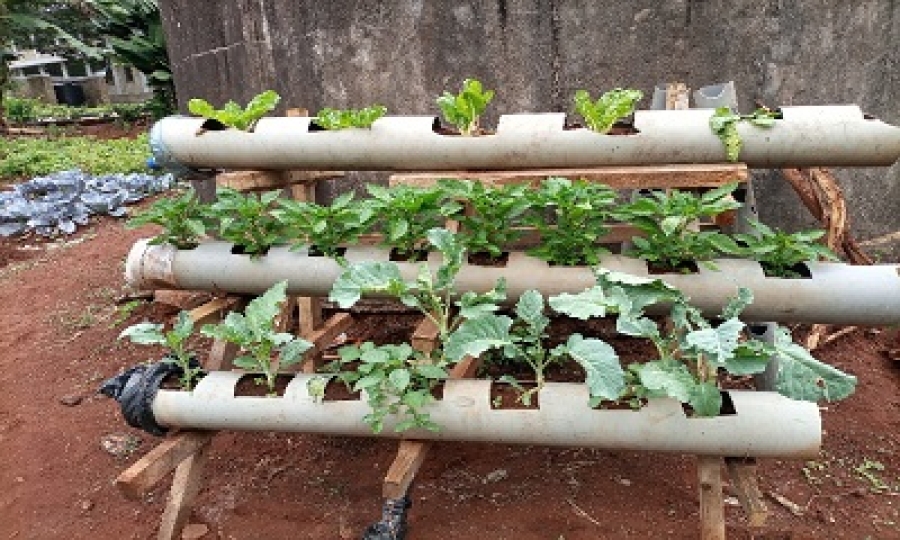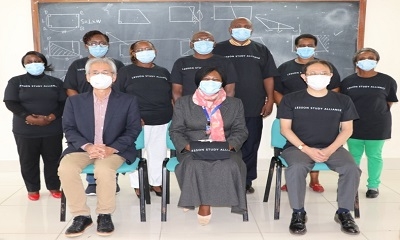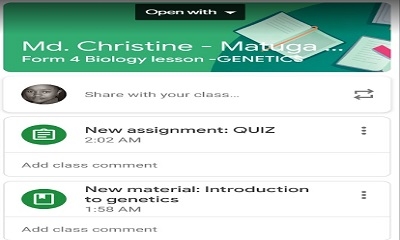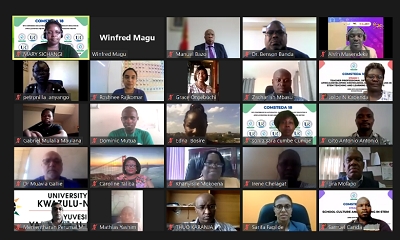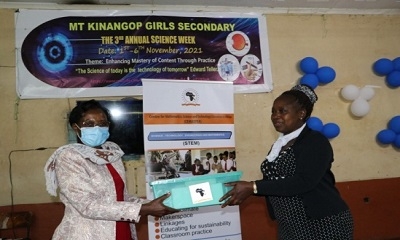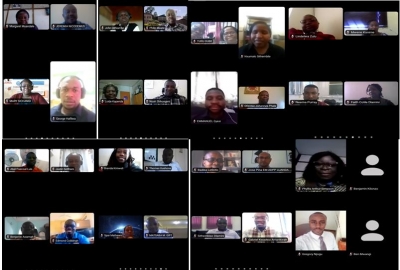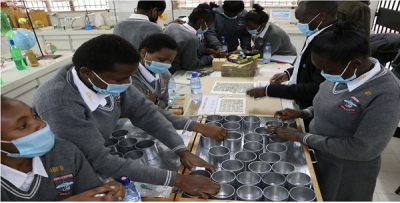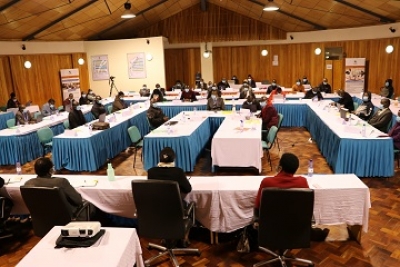CEMASTEA News 162
Children categories
Written by Patrick Wanjohi
Food security is one of the most critical sectors of any country. Achieving it requires constant change in producing our food amidst a growing population, especially in urban areas. Rural-urban migration has led to a higher population in urban settings and the demand for more quality food. This paves the way for innovation in food production. The underlying principle is producing more food with fewer resources, including space, water and labour. One such innovation is multi-storey gardens that increase the vertical distance, allowing more plants to grow. CEMASTEA has set vertical gardens to demonstrate the possibility of growing food, guarantee the quality, and reduce living costs through savings on food purchases. The garden can accommodate at least 100 vegetable seedlings to sustain a family unit. Some of the benefits of vertical gardening include;
- Increased production from space maximization.
- Reduced water use
- Reduced labour because there is no weeding required and planting and harvesting are physically more accessible than conventional bending.
- Ability to lure young people into agriculture, especially in urban areas
Vertical gardening can take many forms and can use locally available materials, e.g. waste pipes, gunny bags, containers, among others. One only needs a mechanism to stack the planting media vertically. At CEMASTEA, we have constructed a multi-storey garden and vertical pipes gardens. This can be replicated in schools and communities for more people to adopt the innovative practice and contribute to food security at the household level.
(Left) A photo of the multi-storey garden and (right) vertical gardening with waste pipes
Written by Dr Mungai Njoroge
The Ministry of Education mandates CEMASTEA to provide continuous professional development of teachers in STEM education. Among recent initiatives put in place by CEMASTEA includes mentoring teachers into practitioner authorship. Guided by transformative praxis, the mentoring initiative intends to attain two outputs. Firstly, provide teachers with decolonized spaces for documenting their lived contextual experiences as practitioners and secondly, encourage sharing of lived experiences among practitioners in communities of practice. The transformative praxis initiative by CEMASTEA came at a reasonable time given the many challenges posed to the education sector by the COVID-19 pandemic. As practitioners, teachers have valuable stories to share towards enhancing the teaching and learning process. During the three weeks mentoring experience provided by CEMASTEA, participants shared lived experiences and scholarly pursuits for social change via reflexive research and practice. Some of the stories were handy towards supporting the continuity of learning during the COVID-19 pandemic. CEMASTEA, through the Research & Development Knowledge Management (R&D KM) Department, is in the process of actualizing documentation and sharing of these lived experiences and stories through the establishment of a practitioner journal. The R&D KM department shared this mentorship initiative at The Centre for Leadership & Diversity International Conference, held online from December 10th to 11th, 2021, by the University of Toronto. Conference participants lauded the initiative by CEMASTEA, which was deemed a timely intervention to mitigate the dearth of literature on quality education from sub-Saharan Africa.
Dr. Mungai Njoroge presenting a paper on behalf of CEMASTEA at the CLD Conference – University of Toronto
Written by Njeri Mburu & Winfred Magu
In 2020 CEMASTEA, with support from JICA, started a Collaborative Lesson Research (CLR) Project. Collaborative Lesson Research (CLR) is Teacher Professional Development (TPD) that borrows from the Japanese culture of lesson study. It aims to support teachers' professional learning through classroom collaborative action research. To successfully implement the Project, a team of CEMASTEA national trainers has received training and support from two lesson study experts in mathematics education; Dr Akihiko Takahashi and Professor Fuji in Tokyo. The training objectives included building capacity to demonstrate Teaching Through Problem Solving (TTP); Acquiring skills and knowledge to guide pilot school teachers to design teaching activities for TTP and, the Appreciation of TTP as a process of building learner’s problem-solving skills.
Mr Kuria of Mathematics Dept. CEMASTEA, exchanging ideas with Professor Akihiko Takahashi during a CLR session
Dr Takahashi took the trainers through a common practice by Japanese teachers called “Neriage”. In this practice, the teacher engages learners in a whole-class discussion, encouraging them to express their ideas and listen to other learners’ ideas. The teachers facilitate learners’ conversations to build ideas and correct their misconceptions. During the training, Director, CEMASTEA, stated that the training was timely as knowledge and skills in collaborative research lessons gained would be ploughed into CEMASTEA INSET programmes. She challenged the participating team to cascade the training to the rest of the staff. While the training predominantly focused on CLR in mathematics, a similar programme will be offered for science lessons.
Written by Makanda John & Ann Mumbi, CEMASTEA
The 2021 Strengthening of Mathematics and Science in Secondary Education (SMASSE) course for mathematics and science teachers took place from the 18th -29th October 2021 in all 47 counties. The training theme was enhancing teachers’ competencies in remote learning techniques for effective teaching and learning mathematics and science. By the end of the training, participants were expected to demonstrate skills and competencies, plan and implement lessons online using Microsoft Teams, Google Classroom, virtual laboratories and animations. Further, they were to demonstrate an understanding of Competency-Based Curriculum (CBC) and appreciate the need for continuous Professional Development (PD).
The training was officially opened in all 47 counties by officers from the Ministry of Education and Teachers Service Commission. During the opening ceremony in Nandi County, Chief Guest, County Director Mr Zachary Mutwiri, thanked CEMASTEA for being far-sighted to the need of equipping teachers with current pedagogies and, in particular online ICT skills. He noted that virtual interactions are the new norm and called on participants to embrace and apply knowledge and skills learnt. He added that ICT in schools makes learning more interactive and fun, especially the simulation of real-life situations. Mr Mutwiri observed remote learning would help fill the gap experienced through teacher shortage forced closures of schools brought about by events such as Covid-19. These messages were reiterated in all other 47 countries by the Chief Guests.
A sample Google Classroom developed by a participant
The training registered success in most counties, with 8,688 STEM teachers participating. Most teachers demonstrated using Microsoft and Google Meet tools to set up, invite participants, conduct synchronous online meetings, and make online presentations. Other vital skills presented included creating and submitting online activities. It is important to note that the teachers will need more practice navigating the online tools for instructional purposes. Some of the challenges observed included low and poor connectivity and the inability to use ICT tools such as mobile phones. Subsequent training will focus on these skills. Officers from the Ministry of Education and Teachers Service Commission monitored and gave valuable input and support throughout the training.
Written by Mary W. Sichangi, Winfred Magu & Gregory Njogu
The Strengthening of Mathematics and Science Education in Africa (SMASE Africa) Association held its 18th Annual Conference on Mathematics, Science and Technology Education in Africa [COMSTEDA 18] from 23rd -25th November 2021. The virtual conference under the theme: Teacher Professional Development in Africa: Knowledge, Skills, Values and Attitudes in Science, Technology, Engineering and Mathematics (STEM) Learning Environments was hosted by the University of Rovuma, Nampula-Mozambique. The conference attracted 58 paper presenters from 11 countries; Botswana, South Africa, Nigeria, Mauritius, Kenya, Namibia, Niger, Mozambique, United Kingdom, Zambia and Uganda.
A screen shot showing participant’s during the conference
During the opening ceremony, Chief Guest, Honourable vice Minister of Education & Human Resource Development-Mozambique, Professor Manuel Bazo, lauded the conference and its intended contribution to STEM education in Africa. He noted that STEM educational disciplines play an integral role in the socio-economic development of African nations. He indicated that the conference was the proper forum to share good practices and innovative teaching approaches. He noted that outcomes could be used to explore new methodologies for learning science, developing and cultivating interest, raising performance, and the motivation to choose courses and professions in STEM. Prof. Cyril Julien, University of Illinois, Urbana-Champaign delivered the keynote speech. CEMASTEA presented three papers; two from the biology department and another by Dr Mercy Macharia of the Chemistry department.
The closing ceremony for the conference was presided over by Dr Benson Banda, President and SMASE – Africa. To ensure an effective learning STEM environment and prepare them to meet the continent's demands, President challenged the participants to balance policy, research, and practice. In her remarks, Executive Secretary SMASE-Africa Mrs Jacinta Akatsa, Director, CEMASTEA, reiterated that the conference provided an opportunity for constructive dialogue on STEM education in Africa. She encouraged more participation, especially on ICT Integration in STEM education. Professor Sarifa Fagilde, Vice President, SMASE-Africa, lauded the Organising committee, the hosting Committee in Mozambique and the SMASE Africa Secretariat for organising such a successful conference. She noted that such partnerships would contribute to Africa’s aspirations to realize quality STEM education and act as a stepping stone towards more scientific and technological innovations. Uganda's Ministry of Education will host the 2022 COMSTEDA 19 conference.
Written by Dan Orero, CEMASTEA & Peter Ndiritu, Mt. Kinangop Girls
Mt. Kinangop Girls’ Secondary held their third Annual Science Week from 1st to 6th November 2021. The theme of the science week was ‘Enhancing Mastery of Content through Practice’. The week was marked with numerous activities designed to provide active learning experiences for the students. These included peer teaching, group discussions, making teaching & learning aid models, symposiums, quick-fire sessions and STEM-based edutainment. Learners were expected to develop skills in communication & collaboration, critical thinking, creativity, problem-solving, and self-efficacy.
During the closing ceremony, the Chief Guest Director CEMASTEA, Mrs Jacinta L. Akatsa, represented by Deputy Director Mrs Lydia Muriithi, affirmed that the knowledge and skills learnt will be helpful beyond school and will make them more adaptable and competitive in future. She was delighted by the demonstration of skills by the learners. She informed the learners that CEMASTEA functions to assist schools in becoming better in STEM education and promoting innovations that solve real-life problems.
In her remarks, senior Principal Mrs Jane N. Njoga noted that we live in an ever-changing world with emerging challenges that require creativity and innovativeness in home-grown solutions. She emphasized the importance of learners aspiring to be scientists to be curious, attentive, and able to do research. In addition, she reiterated that learners should aspire to apply the knowledge learned to solve societal problems. She thanked the teachers for coming up with the noble idea and promised to make the event part of the school culture. CEMASTEA donated a science kit to the school.
Mrs. Lydia Muriithi (left), Deputy Director, CEMASTEA presenting a science kit to Mrs. Jane N. Njoga, Senior Principal Mt. Kinangop Girls’ Secondary during the schools’ Science Week closing ceremony.
Written by Dan Orero and Mary Sichangi.
The ‘Slow Education’ concept enhances students’ ability to learn how to learn and develop values and ethics to live a joyous life in the slow lane.
A section of the Padlet with some of the posts from the participants
The International webinar on Principles of ‘Slow Education’ in the context of STEM Education. was organized by the Centre for Mathematics, Science and Technology Education in Africa (CEMASTEA) as a form of knowledge management and sharing based on a training conducted by A. Ofri International Centre, Israel. The Webinar took place on Tuesdays and Thursdays from 12th to 26th October, 2021.
The training offered participants an opportunity to hear from each other and gain greater understanding while putting into practice the knowledge acquired.
Speaking during the opening ceremony held on 13th October 2021, the chief guest, Director General, Ministry of Education represented by Ms. Margaret Muandale, the Director Teacher Education, Ministry of Education, Kenya applauded CEMASTEA for conducting such a training that will help cascade the principles of slow education to the various countries. She indicated that the training was in line with the Sustainable Development Goal 4 (SDG 4); that aims at ‘ensuring inclusive and equitable quality education that promotes lifelong learning opportunities for all’.
Ms. Margaret Muandale,
Director Teacher Education, Ministry of Education during the opening ceremony
Director CEMASTEA, Mrs. Jacinta Akatsa in her welcome remarks, affirmed the participants that the webinar was tailored to equip ministry of education officials in charge of STEM education with necessary skills to integrate principles of slow education in STEM policies. She further remarked that, for school principals the webinar was to encourage institutionalization of school level policy to support pedagogical leadership of STEM education. Participants were emboldened to be agents of change of quality of STEM education in their country.
Mrs. Jacinta L. Akatsa, HSC,
Director CEMASTEA
Speakers & Facilitators from CEMASTEA:
Mrs. Lydia Muriithi (top left), Deputy Director Corporate; Mrs. Mary Sichangi (top right), Coordinator Partnerships and Linkages; Mr. John Odhiambo (bottom left), National Trainer and Mr. Philip Maate, National Trainer, during the opening ceremony of the international webinar
The webinar facilitated by CEMASTEA staff involved synchronous learning through the Zoom platform and asynchronous learning through the Google classroom & the Padlet media platform.
Participants during the opening ceremony
In order to compliment STEM education and enhance the capability of learners in 21st century skills and knowledge, the webinar was crafted to cover five sessions namely; Slow movement and slow down narrative, World of concepts and deepen in principles; From thoughts to deeds, From idea to action (Presentations) and Educational and pedagogical innovation in STEM education. The participants were actively involved and made presentations that demonstrated understanding of concepts as illustrated in the padlet links.
The closing ceremony of the webinar took place on 26th October 2021, graced by the chief guest, Dr. Reuben Nthamburi, Director Quality and Standards at Teachers Service Commission (TSC), who represented the C.E.O, TSC, informed the participants that the commission is always geared towards well maintained teaching standards. He urged them to develop a positive mindset and implement the training in their respective countries with the aim of transforming to learning improvement hence achieving quality learning.
Dr. Reuben Nthamburi,
Director Quality and Standards, Teachers Service Commission (TSC) during the closing ceremony
In her remarks, Director of the Aharon Ofri International Training Center, Ms. Yudith Rosenthal reiterated that ‘Slow education’ is not defined by doing things slowly, but deeply hence achieving the quality desired. She encouraged them to implement lessons learnt during the International Webinar in their respective countries.
Ms. Yudith Rosenthal, Director
The Aharon Ofri International Training Center, Israel
Director CEMASTEA, Mrs. Akatsa congratulated the participants for successfully completing the course and thanked the TSC for continuous support in implementing Teacher Professional Development courses. She affirmed that the webinar will inculcate entrepreneurial skills among learners that are vital for sustainable development. She encouraged them not only to make good use of the ideas in the Padlet as rich reservoir of ideas for engagement, but also cascade lessons learnt. She promised that CEMASTEA will continue cascading the training to teachers in STEM schools in Kenya through similar webinars.
Mrs. Jacinta L. Akatsa, HSC, Director CEMASTEA, presenting a sample certificate to
Mr. Maikudi Abdul having successfully completed the webinar
School Visit Ngaru Girls Secondary School
Article written by Beatrice Macharia and Winfred Magu
Photos by Winfred Magu
School visits at CEMASTEA play an integral role in enhancing learning and motivation towards STEM education and linking classroom experiences with real life. During the visits, learners engage in activities across various subjects, mainly in Science, Technology, Engineering and STEM and Mathematics (STEM), Education for Sustainable Development (ESD) innovations and Information, Communication & Technology (ICT). They perform experiments, engage in discussions also benefit from motivational talks.
In September, CEMASTEA hosted fifty-seven learners and two teachers from Ngaru Girls Secondary school Kirinyaga County. The learners had the opportunity to experience the fun of learning by engaging in various activities. In biology, they did anaerobic respiration, ecology, and transport in animals, support and movement. In chemistry, they undertook activities in electrolysis and gas law experiments. Concepts demonstrated in physics included electromagnetic induction, Van deer Graph principle and pressure. In ESD, they focused on environmental conservation activities and the setting up of a black soldier fly project.
Ngaru secondary school student engage in STEM and ESD activities during the visit.
The most exciting part of the visit was the innovations laboratory. Here the learners performed activities to enhance their critical thinking, problem-solving, and creativity and innovations skills. The Committee on Special Programmes, Student Learning coordinates the school visits at CEMASTEA.
Beatrice Macharia and Winfred Magu, CEMASTEA
ICT Training: Witu Mjini Secondary School Teachers
Article written by Beatrice Macharia and Muyanga Mutua
Photos by Maulidi Khalfan and Justus Wambua
Teacher Professional Development (TPD) empowers teachers to deliver better lessons and learning experiences. In this recognition, Witu Mjini Secondary school Principal Mr Paul Wainaina supported his teachers and lab technicians to attend a two-day customised training at CEMASTEA from 27th and 28th August. The teachers also used the opportunity to engage in team-building activities facilitated by Wambugu wa Kamau, a motivational speaker.
The customised training focused on enhancing the skills of the teachers and technicians to integrate ICT in teaching and learning. The training with a practical orientation had sessions that included; the concept of ICT integration, introduction to Technology, Pedagogical and Content Knowledge (TPACK) model, using remote learning, and conferencing resources to plan and deliver lessons. These resources include Zoom, Microsoft teams, Google Meet and Google Classroom. Other activities during the training were visits to the Education for Sustainable Development (ESD) projects, mathematics room, science laboratories and the innovations room.
This training equipped the teachers with knowledge and skills for engaging learners remotely and developing innovative activities that could enrich learning in their school. Participants were awarded a certificate at the end of the training.
During the closing ceremony for the training, the Director congratulated the school leader for supporting his entire staff to attend the training. She noted this set an excellent example for the rest of the schools in the country. She promised to promote the school through the provision of science equipment and further collaboration in future.
Director CEMASTEA, Mrs. Jacinta Akatsa, HSC awards a certificate to the school principal Mr. Paul Wainaina
Teachers from Witu Mjini Secondary School, Lamu County, engaged in innovative learning activities during a visit to CEMASTEA
Director CEMASTEA, Madam Jacinta L. Akatsa, HSC, giving key note address during the opening ceremony of a one week training workshop by CEMASTEA to 30 teachers of mathematics and science from Sunshine secondary school. The training theme was ‘Enhancing effective learner involvement through learner centered pedagogies”. She emphasized the need to breakdown concepts in a form that is easier for comprehension by learners. She shared very insightful lived experiences of innovative strategies that promote effective learning. She advised participants to embrace forums that allow sharing of lived experiences in teaching and learning as a great strategy that impact on curriculum delivery.
Mrs. Jacinta L. Akatsa, HSC, Director CEMASTEA during the opening ceremony of a one week training workshop to Sunshine Secondary School Math/Science teachers



